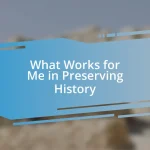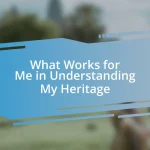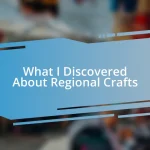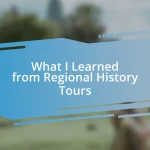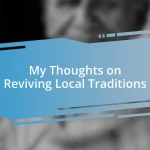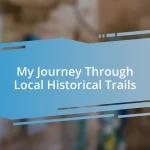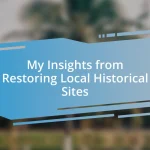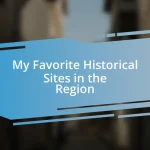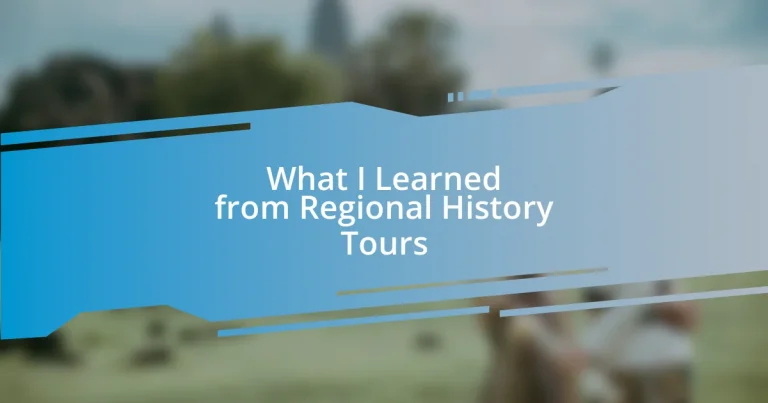Key takeaways:
- Regional history tours offer immersive experiences that connect participants with local culture and historical narratives, fostering a deeper understanding of community identities.
- These tours provide education through engaging storytelling, promote community connections, and inspire a sense of belonging and active participation in local history.
- Interacting with local historians enriches the experience, challenging preconceived notions and encouraging reflection on how historical insights can be applied to contemporary life and community engagement.
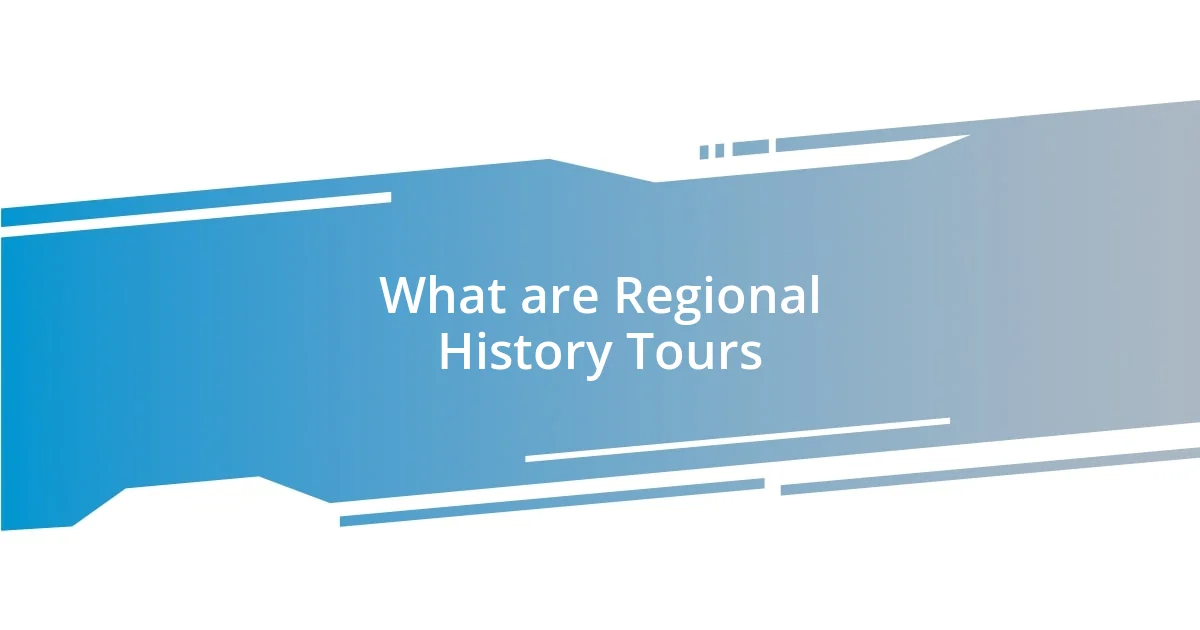
What are Regional History Tours
Regional history tours are immersive experiences that take participants beyond the surface of historical facts, connecting them deeply with the culture and stories of a specific area. I recall standing in a small, quaint town, listening to a guide recount the tales of local heroes and forgotten legends—it struck me how these stories breathe life into the very streets we were walking on. Isn’t it fascinating how a single location can hold centuries of narratives that shape our understanding of who we are today?
These tours often include visits to significant landmarks, museums, and sometimes even private homes that reveal a community’s unique heritage. I remember feeling a mix of nostalgia and pride as I wandered through a restored home, imagining the lives of those who once filled its rooms with laughter and sorrow. It made me question how many of us take the time to appreciate the rich tapestry of our regional identities.
Furthermore, guided by local historians or passionate storytellers, these tours often intertwine insights about historical events with modern-day implications. Have you ever thought about how the past influences present decisions? During one such tour, I was inspired by how the guide emphasized the lessons learned from pivotal moments in our region’s history, making me realize that understanding our roots is essential for shaping a better future.
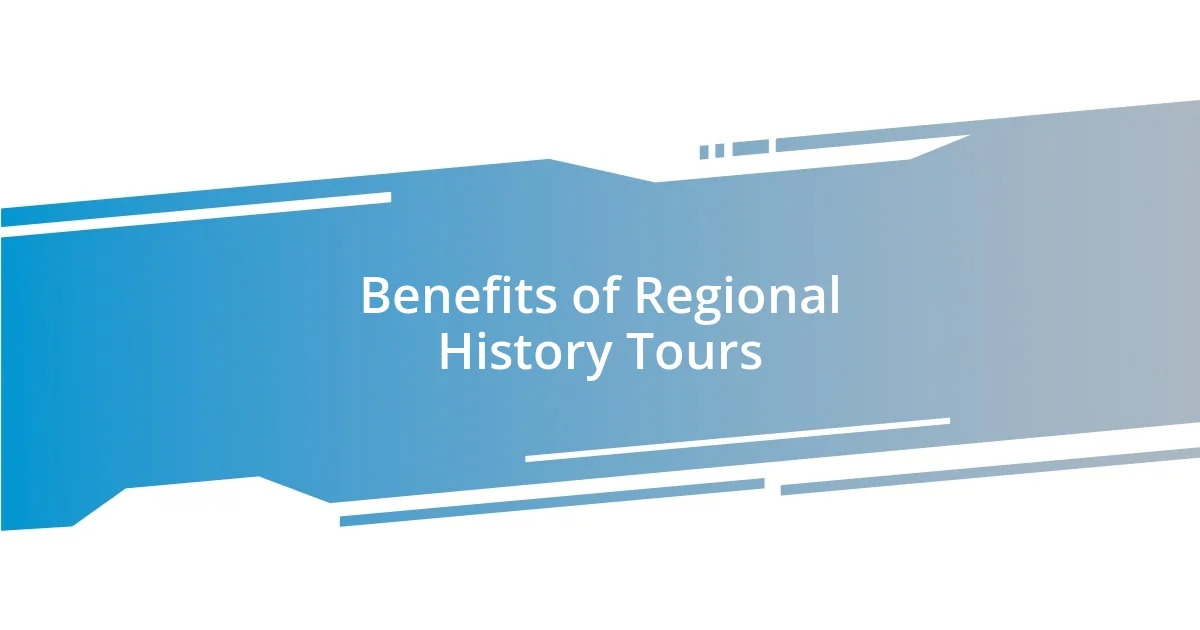
Benefits of Regional History Tours
I’ve found that one of the primary benefits of regional history tours is the education they provide in a lively and engaging environment. Unlike textbooks, which often feel dry and distant, these tours make history tangible. I remember the moment a guide shared a story about a local historical figure; it was like stepping into a time machine. Suddenly, dates and events transformed into relatable human experiences, sparking my curiosity and a thirst for knowledge that I hadn’t felt in years.
Another advantage is the sense of community they foster. During my explorations, I often met fellow enthusiasts who shared my passion for history. I still recall a lovely conversation with an elderly woman who had lived through some of the very events we were studying. Her personal anecdotes added layers to my understanding, proving that regional history is not just about dates, but about the people who shaped those stories. Those connections are invaluable and create a lasting bond with both the past and the present.
Finally, regional history tours can inspire a profound sense of belonging. On one tour, standing at the site of a historic debate that shaped local legislation, I felt a surge of pride. It dawned on me that I am part of this ongoing narrative, and it urged me to engage more actively in my community. Have you ever felt that same connection? It can be transformative to realize that history is not merely something we read about—it’s living, breathing, and unfolding all around us.
| Benefit | Description |
|---|---|
| Education | Transforms dry historical facts into engaging stories through interactive experiences. |
| Community | Fosters connections with fellow tour participants and local individuals, enhancing understanding. |
| Belonging | Creates a personal connection to regional narratives, inspiring active community engagement. |

Key Locations to Visit
Exploring key locations during these history tours can feel like unearthing hidden treasures. One place that stood out for me was a small civil war battlefield, where I could almost hear the echoes of history in the air. Standing among the monuments and markers, the weight of the past became palpable, and I felt a deep sense of appreciation for those who fought for their beliefs. It’s extraordinary how a physical space can evoke such strong emotions, isn’t it?
Here are some must-visit locations that truly bring regional history to life:
- Local Museums: These often showcase artifacts and exhibits that tell the unique story of the area.
- Historic Homes: Walking through preserved residences allows you to envision daily life generations ago, sparking a sense of connection to those who lived there.
- Battlefields: Standing in the very places where significant events unfolded can be a powerful reminder of the sacrifices made in history.
- Landmarks: Each monument or statue carries a rich narrative, offering insights into the region’s cultural significance.
- Ghost Tours: Surprisingly, these tours often reveal historical truths through the stories of the past, adding both intrigue and a sense of community folklore.
Each location holds a special place in my heart, offering lessons that resonate on multiple levels. The discovery of these significant sites always leaves me eager to learn more about the stories they tell.
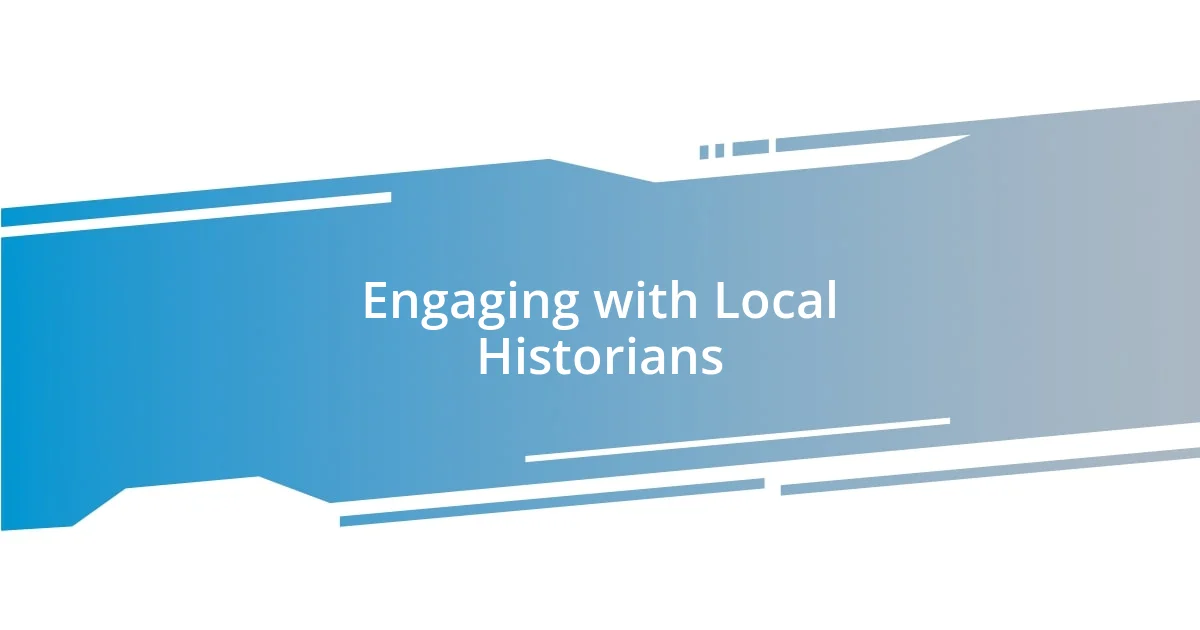
Engaging with Local Historians
Engaging with local historians can be one of the most rewarding aspects of a regional history tour. I vividly remember chatting with a historian who shared his deep knowledge of a nearly forgotten local conflict. As he recounted tales of bravery and sacrifice, I felt a rush of emotion that no textbook ever instilled in me. It’s fascinating how a single person’s storytelling can revive the past and breathe life into history.
What struck me during these interactions was the genuine passion these historians exhibit. One evening, I sat in a small café with a local historian who recounted his own family’s experiences during pivotal events in the community. His eyes lit up as he shared personal anecdotes about his ancestors, making me realize that history is very much alive within families. Have you ever felt that thrill when someone shines a light on your own roots? It brings a whole new layer of understanding and connection.
Interacting with historians doesn’t just enhance your knowledge; it also ignites curiosity about your own community. After a tour, I found myself wanting to dig deeper into local archives and even attend town meetings to learn more. It made me wonder: how many histories are waiting to be uncovered in our neighborhoods? Engaging with local historians can motivate us to become active participants in the stories unfolding around us.
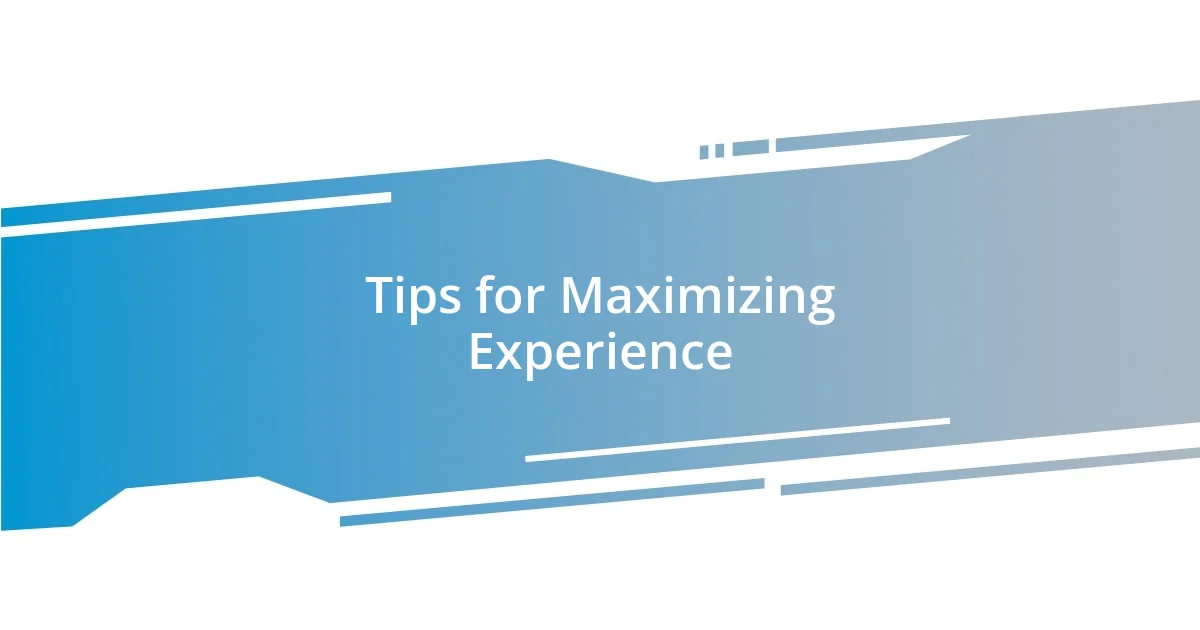
Tips for Maximizing Experience
Maximizing your experience on regional history tours starts with being an active participant. I remember one specific tour where I took the time to ask questions rather than just listen passively. My inquiry about a local legend led to an unexpected discussion, where I learned the backstory of the founding families in the area. It was in that moment I realized how much more enriched the experience could be when I engaged actively with the material presented.
Another tip is to keep a journal during your travels. I’ve found that writing down my thoughts immediately after each visit allows me to reflect on the emotions and insights I experienced throughout the day. The first time I tried this, I was amazed at how much detail I captured. It turned out to be an incredible reference point for weaving my narrative when sharing stories with friends and family later. Plus, there’s something special about looking back at those notes and recalling the feelings of joy or contemplation I had while standing in those historical spaces.
Lastly, consider visiting during off-peak hours for a more intimate experience. I once visited a historic site early in the morning when it was nearly deserted, and I was struck by how different the atmosphere felt. Without the crowds, I could absorb the ambiance and truly connect with the surroundings. It made me wonder, how often do we rush through experiences when we could savor them instead? Taking the time to immerse yourself fully can turn a simple visit into a profound journey through time.
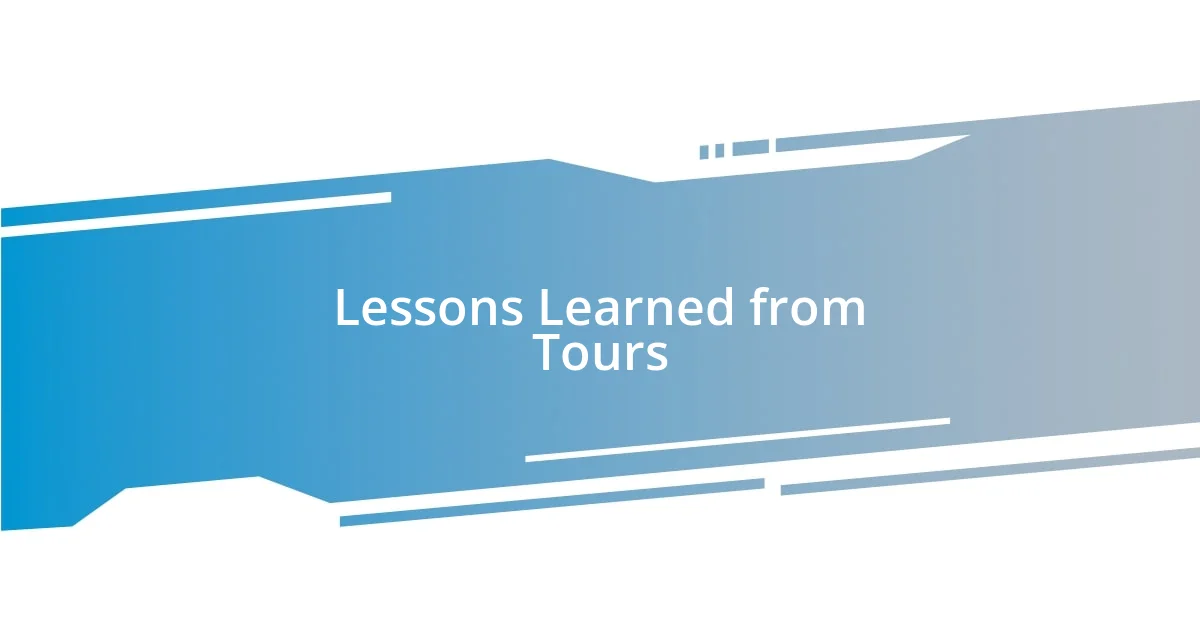
Lessons Learned from Tours
One major lesson I learned from my regional history tours is the significance of place in shaping narratives. During a visit to an old battleground, I felt an eerie yet powerful connection to the land—a sensation that textbooks simply can’t replicate. Standing there, I found myself pondering: how does our environment influence the stories we tell? It became clear to me that history is not just events; it’s deeply woven into the very soil we walk on.
I also discovered that every tour is a learning opportunity about resilience and community spirit. At one site, I encountered a passionate guide who shared a story about a devastating flood that nearly wiped out the town. As she described the efforts of the residents to rebuild their lives and homes, I was struck by the strength of the human spirit. Have you ever witnessed a community come together in the face of adversity? It’s moments like these that remind me of the importance of persistence and unity in shaping our shared history.
Another valuable insight I gained is how history tours can challenge preconceived notions. I remember attending a discussion on a controversial chapter in our region’s past. Initially skeptical, I found myself captivated by perspectives I hadn’t considered before. Engaging with a diversity of viewpoints prompted me to reflect on my biases—how often do we limit our understanding by clinging to a single narrative? Embracing different stories can profoundly expand our worldview and deepen our empathy for others.
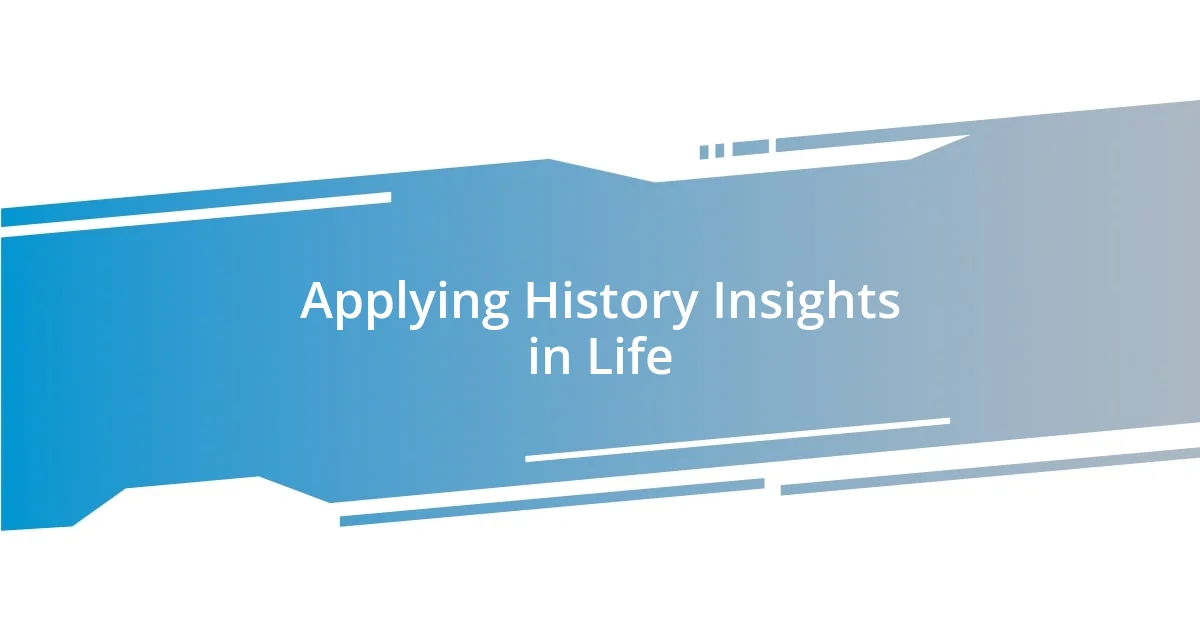
Applying History Insights in Life
When I think about applying historical insights to my daily life, I’m reminded of an old town’s story I encountered during one of my tours. The guide recounted how a local craftsman preserved age-old techniques, passing them down through generations. It struck me that this commitment to tradition isn’t just about keeping the past alive; it’s about integrating those timeless practices into modern creativity. Don’t you feel inspired when you see how the past can continuously enrich our present lives?
On another occasion, I stood in front of a historical monument that marked the site of a pivotal moment in civil rights. The energy there was palpable, and I felt this wave of responsibility wash over me. It made me ponder: how can the lessons of resilience and courage from those who fought for justice influence my approach to contemporary issues? Understanding history equips us not only with knowledge but also with a sense of duty to advocate for what’s right today.
I’ve also realized that history teaches us about the importance of perspective. During a particularly thought-provoking tour, I met people from various walks of life who shared their interpretations of the same event. Their words fueled in me a sense of curiosity and, honestly, a little discomfort, but it dawned on me—how often do we stop to truly consider other viewpoints? This was a gentle nudge reminding me that to learn and grow, we must remain open to the complex tapestry of narratives that surround us.
